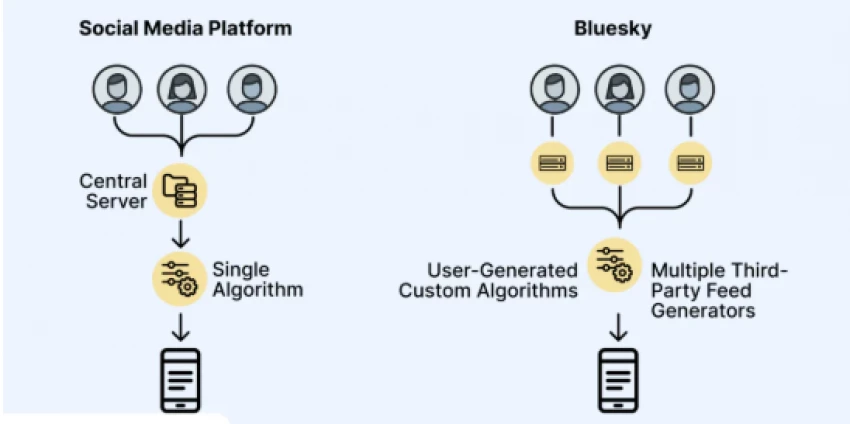

BlueSky Social Media is a decentralized social network designed to give users more control over their online identity, content, and data. It was originally incubated by Twitter in 2019 but later spun off into an independent project. The platform launched its beta version in early 2023 and opened to the public in February 2024.
Let’s break down what makes BlueSky different — and why it matters.
At its core, BlueSky is a decentralized social networking protocol, not just an app. The official app, also called BlueSky, is built on this protocol — known as the AT Protocol (Authenticated Transfer Protocol).
This means BlueSky isn’t just a competitor to Twitter (now X). It’s a whole new infrastructure for building social apps that aren’t controlled by a single company.
)
BlueSky was built with a mission to create a more open and resilient social web.
@yourname.com) for verification, instead of paying for blue checkmarks.
| Feature | BlueSky | Mastodon | Threads (by Meta) |
|---|---|---|---|
| Protocol | AT Protocol | ActivityPub | Centralized (Meta) |
| Decentralized? | Yes | Yes | No |
| User Handle Style | Custom (e.g. @your.site) | @[email protected] | Instagram handle-based |
| Interoperable? | Not yet with others | Yes (with Fediverse) | No |
| Ownership | Public-benefit corp | Federated open-source | Meta |
| Monetization | Future optional tools | Donations, Patreon, etc. | Meta's ad ecosystem |
BlueSky’s biggest difference is its focus on modularity — apps, moderation, and algorithms can all be chosen or created by users.
By mid-2024, BlueSky had over 5 million users. Most early adopters were:
Yes. As of February 2024, BlueSky is publicly available — no invite codes needed.
Pros:
Cons:
If you care about data ownership, algorithm transparency, and free speech within reasonable moderation, BlueSky might be the future of social networking.
It's a direct response to the centralized, profit-driven models that dominate social media today. Instead of monetizing your attention, it wants to give you control.
As of late 2025, the roadmap includes:
BlueSky isn’t just another Twitter clone. It’s a reimagination of what social media could be — user-first, open-source, and transparent.
Whether it takes off depends on how many people care about digital sovereignty. But if you're tired of centralized control, it’s worth a look.
Be the first to post comment!